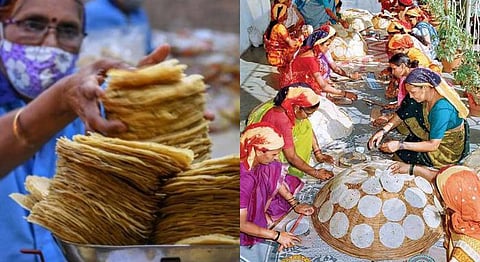
- HOMEGROWN WORLD
- #HGCREATORS
- #HGEXPLORE
- #HGVOICES
- #HGSHOP
- CAREERS
- ABOUT US
- CONTACT US

The stories of humble beginnings are invariably heart-warming. Journeys of hope, hard work, and dedication are always the ones that bring about a certain warmth that rarely exists in other stories. The ‘small town to big city’ narrative is driven by elements that are purely human, and we wouldn’t have it any other way. The tale of the unmistakable Lijjat Papad belongs to this category.
Way back in 1959, Jaswantiben Popat along with six of her friends, Banuben Tanna, Chutadben Gawade, Jayaben Vithalani, Laguben Gokani, Parvatiben Thodani, and Ujamben Kundalia were in the process of trying to figure out how to reduce the financial strain on their respective families. With a sum total of INR 80, they birthed the idea of Lijjat Papad, which is now a business valued at INR 1,600 Crore.
Girgaon (earlier known as Girgaum) in Mumbai is the birthplace of Lijjat. Jaswantiben’s and the other women’s hometown, it is here that they began their humble papad venture. In its nascent stages, the sole purpose of the business was to earn profits so as to ease financial tensions in their homes. Later on, as the business grew, so did the motivations and attempts at outreach to women in need. Admirably, the food business turned into a place where women could go to gain autonomy and place faith in their own capabilities to earn a wage.
The seven women rolled and put together four packets of papad that were sold the next day. Word of mouth began to work its magic, and women of nearby areas approached them to join in. As the number crossed 25 women, the group was registered as Shri Mahila Griha Udyog Lijjat Papad. It was shortened to simply Lijjat Papad in 1962. Today, over 45,000 women work relentlessly to uphold the name of the food business.
At the core of Lijjat’s principles lies the fact that all women are not simply employees, but the reason because of whom Lijjat Papad exits. Jaswantiben said in an interview with Wildnerness Films India, ‘Everyone here is a partner and does not work for any other person, which was one of the factors that enabled women to join at the beginning.’ Speaking to SheThePeople, she said that she wishes to treat every woman as a maalik. Each of these women becomes a Lijjat Behen (sister) when they join, pointing to the fact that equality is of utmost importance. Even today, the profits are shared equally among each employee. To avoid unemployment and the risk of the women losing jobs, Lijjat does not use automated machines, and to date, each papad sold is rolled by hand. Their recruitment process, too, holds no prerequisites and gives every woman an equal opportunity to work, so long as they abide by the quality regulations.
Until 1968, Lijjat Papad was established only in Maharashtra. It was then that they ventured out of the state, and set up its first branch in Valod, Gujarat. Even by expanding the business, the prospect of quality was never compromised. The ingredients are allowed to shine and speak for themselves, not just in their papad, but also their other products including masalas and wheat flour.
‘One of the principles is to ensure that only the best quality of raw materials are utilised in the papad, and there is no compromise on this aspect,’ says Swati Paradkar, President of Shri Mahila Griha Udyog Lijjat Papad. Having maintained this quality in the last 60 years is a major reason for our success.’
Lijjat Papad is more than simply a legacy – it is an institution that stands for empowerment, identity, strength, and determination. It began at a time when there was no acceptance of working women, and the chance of gaining respect was absent, too.
If you enjoyed reading this, we suggest you also read:
